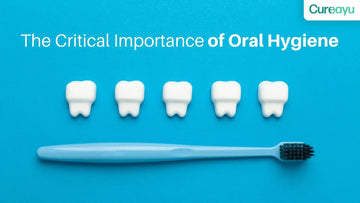Oral hygiene is often an overlooked aspect of our daily routines, yet it plays a crucial role in maintaining overall health. Many people are aware that brushing and flossing are good practices, but may not understand the full extent of their benefits or the risks associated with poor oral hygiene. Proper oral care goes beyond having a bright smile; it impacts your general well-being, potentially affecting various aspects of your life from self-esteem to heart health.
Understanding the importance of oral hygiene can lead to significant improvements in overall quality of life. This blog aims to shed light on why oral hygiene is essential, its purposes, and the numerous benefits it provides. By diving deep into the subject, we hope to encourage more people to prioritize their oral health and adopt better habits.
Also Read: The Surprising Dietary Fiber Benefits You Need to Know About
Why Is Oral Hygiene?
Oral hygiene refers to the practice of keeping one’s mouth clean and free from disease and other problems through regular brushing, flossing, and professional dental care. The main goals are to prevent dental problems like tooth decay and gum diseases (gingivitis, periodontitis), but oral hygiene also contributes significantly to other health sectors.
Several microorganisms produce plaque, the sticky film that forms on teeth. If not removed, this plaque can harden and form tartar, leading to more severe conditions like cavities and gum diseases. This is why oral hygiene must be a consistent and thorough part of our day-to-day lives.
Purpose Of Oral Hygiene
The primary purpose of oral hygiene is to prevent the buildup of plaque and tartar, which are the main culprits behind tooth decay and gum diseases. However, its importance extends far beyond the prevention of dental ailments. Proper oral hygiene habits can prevent bad breath (halitosis), minimize tooth wear caused by acidic foods, and reduce the risk of oral infections.
Moreover, maintaining good oral hygiene can have systemic benefits. Research has shown that the mouth can serve as a gateway to the rest of the body. Bacteria from periodontal disease can enter the bloodstream and potentially affect other organs, increasing the risk of conditions such as heart disease and stroke. Therefore, good oral hygiene practices serve as both a preventive measure for oral diseases and as a safeguard for your overall health.
Also Read: Discovering the Bountiful Plant-Based Diet Benefits: Health, Environment, and Beyond
Why Oral Health is Important
Prevent Tooth Decay
Tooth decay is one of the most common oral issues affecting people of all ages. Poor oral hygiene leads to the accumulation of plaque, which breaks down the enamel and creates cavities. Practicing good oral hygiene by brushing twice a day and flossing daily can effectively prevent tooth decay.
Avoid Gum Diseases
Gum diseases like gingivitis and periodontitis not only cause swollen and bleeding gums but can also lead to tooth loss if left untreated. Regular dental check-ups, combined with good oral hygiene practices, significantly reduce the risk of developing gum diseases.
Enhance Self-Confidence
Having clean, healthy teeth and fresh breath can dramatically improve your self-esteem and confidence. Good oral hygiene helps you avoid issues like bad breath and discolored teeth, helping you feel more comfortable in social interactions.
Overall Health Connection
Good oral hygiene is linked to the prevention of various health issues. Studies have shown that gum disease can be an indicator of systemic problems like heart disease, diabetes, and respiratory issues. Thus, maintaining good oral health can be an effective measure in preventing certain systemic diseases.
Benefits Of Oral Care
Improved Digestive Health
Chewing is the first step in the digestive process. Having healthy teeth and gums ensures you can chew your food properly, aiding in more efficient digestion.
Cost-Effective
Good oral hygiene can save you money in the long run by preventing costly dental procedures. By investing a small amount of time each day in cleaning your teeth and gums, you can avoid high medical bills down the line.
Enhanced Cognitive Function
Research has suggested a link between oral health and cognitive function. Poor oral hygiene might contribute to memory loss and cognitive decline, so keeping your mouth healthy could potentially benefit your brain as well.
Better Pregnancy Outcomes
For pregnant women, maintaining good oral hygiene is especially crucial. Poor oral health can lead to premature birth and low birth weight in babies, making it imperative for expecting mothers to maintain good oral care routines.
Stronger Immune System
Good oral hygiene practices can help keep your immune system strong. Chronic inflammation caused by gum diseases can tax the immune system, reducing its ability to fight off other infections.
Conclusion
In conclusion, the importance of oral hygiene cannot be overstated. It serves as a fundamental aspect of overall health, affecting not just your mouth but your entire body. From preventing tooth decay and gum diseases to enhancing self-confidence and overall health, the benefits of good oral hygiene are vast and varied. By investing a small amount of time each day in maintaining proper oral care routines and attending regular dental check-ups, you can safeguard your health, save money, and improve your quality of life. Therefore, make oral hygiene a non-negotiable part of your daily routine. Your body will thank you for it in more ways than one.








